With over 15 million users, Python is one of the most popular programming languages and doesn’t show any signs of stopping.
But if you’re new to Python, or computer science generally, how can you get started?
To answer this, I’ve spent some time researching the very best online Python courses based on their popularity, pedigree and acclaim from both seasoned programmers and rookies.
In this article, I’ll be going over the top ten best online Python courses. I’ll also talk about the advantages of learning Python, what you should look for in a Python class and the cost and length of learning Python.
Let’s begin…
What is the best online Python course?
These are my top Python course recommendations:
- Python For Everybody Specialization (Coursera)
- The Complete Python Bootcamp From Zero to Hero in Python (Udemy)
- Learn Python 3 (Codecademy)
- Learn Python Programming Masterclass (Udemy)
- Introduction to Python (Datacamp)
- The Python Tutorial (Python)
- Applied Data Science with Python Specialization (Coursera)
- CS50’s Introduction to Programming with Python (edX)
- 100 Days of Code: The Complete Python Pro Bootcamp for 2025 (Udemy)
- Crash Course on Python (Coursera)
My top pick for the best online python course is Python For Everybody Specialization offered by Coursera.
This course, as the title says, is for everybody. The range of lessons and classes means that beginners will be comfortable with the material, whereas intermediate and advanced students will have something to gain as well.
Udemy features heavily on this list as well. This is one of the largest e-learning platforms out there. Their classes are created and sold separately on Udemy and are often on sale so you can get them for a lot cheaper than the advertised price.
My top Udemy course for learning Python is The Complete Python Bootcamp From Zero to Hero in Python. With over 22 hours of content, these lessons have an incredible amount of interest with over 1 million students.
In this list, I’ve selected the very best Python courses on offer. But I’ve also tried to include a range of different classes, content and teaching styles in order to appeal to anyone who wants to learn Python.
For example, if you prefer a more hands-on way of learning, which is pretty crucial for coding, you might prefer Codecademy’s teaching style, with Learn Python 3.
Overall, each option on this list has a unique selling point and is highly regarded and recognised among the thousands of Python classes out there.
So, let’s dig in.

Unlock Your Potential With Python
Find the Python course that fits your goals, skill level, and learning style. Start your journey to Python mastery today!
Best Python course reviews
1. Python For Everybody Specialization (Coursera)

Platform: Coursera | Teachers: Charles Russell Severance | Course length: 5 courses, each of which is recommended to be completed in 6-7 weeks
Coursera is partnered with universities and other institutions to provide classes to students all across the world.
This specialization has something for complete beginners and advanced students. It combines taught video lessons with hands-on projects. It's incredibly popular, with over 1 million students enrolled and a 4.8/5-rating from over 200,000 reviews.
You can audit the first course of this specialization free to see if it meets your needs. Just click on our link to go to the specialization. Scroll down till you can see the individual courses, click on the first one, set up an account (free) and choose the audit option.
You will learn:
- Basics of programming using Python
- Core data structures of the Python language
- Using Python to access web data
- Functions and expressions
- Conditional executions
- Manipulating files
- Using databases with Python
- Building web crawlers
- Visualization processes
- Retrieving, processing and visualizing data with Python
Pros:
- Content for everybody, including complete introductions as well as more advanced lessons
- Combines instructor-led videos with hands-on projects
- Taught by an experienced, professional teacher
- Affiliated with a top university
- Covers the essentials of Python and provides a solid foundation in computer science
- The opportunity to earn a certificate
- First course can be accessed for free
Cons:
- The full specialization requires a monthly payment that can work out expensive if you take too long to complete it
Best for: Both complete newbies looking to get started with Python as well as more intermediate programmers who feel they have a little more to learn
Overall: A great course giving you access to both clearly explained video lessons and hands-on projects that will take you from beginner to pro when it comes to Python. It’s also offered through a top university, so you can trust the content and teaching to be professional.
See also best Coursera courses.
2. The Complete Python Bootcamp From Zero to Hero in Python (Udemy)
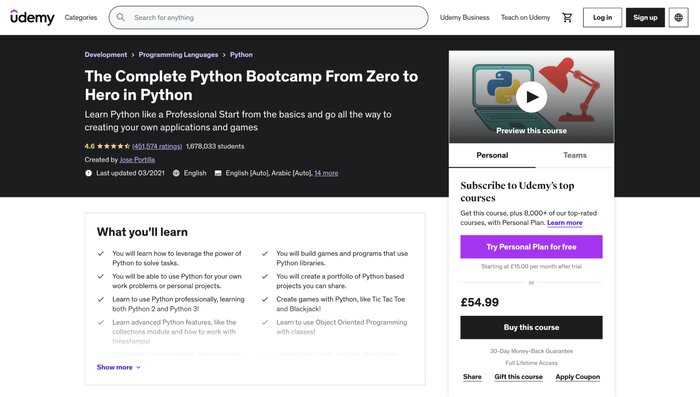
Platform: Udemy | Teachers: Jose Portilla | Course length: 22 hours of on-demand video
My second pick is probably the most popular and acclaimed Python course on the internet.
The Complete Python Bootcamp From Zero to Hero in Python is offered by Udemy, an e-learning site with over 57 million users globally.
Udemy courses are all sold separately, which means that you pay one fee for access to every lesson in this class. This also means that classes are often on sale, and can be purchased for a lower price than initially advertised.
With over a million students, a rating of 4.6 stars out of 5 and a highly qualified instructor, you can’t go wrong with this one.
You will learn:
- Python setup
- Object and data structure basics
- Statements
- Methods and functions
- Object-oriented programming
- Modules and packages
- Errors and exceptions handling
- Python decorators and Python generators
- Web scraping with Python
- Working with images in Python
- PDFs, spreadsheets and emails with Python
- Advanced Python objects and data structures
Pros:
- Appeals to a wide audience, with content for beginners and advanced programmers
- A very experienced instructor, in both teaching and data science
- Loads of content, over 100 lectures and 22 hours of on-demand video lessons
- Well structured, gradually building on your knowledge
- Includes hands-on lessons and projects
- Everything is clearly explained
- Often on sale
Cons:
- May miss some modules or functions that students might find useful
Best for: Beginners looking to devote significant time and effort into mastering Python.
Overall: This course is ideal for anyone new to Python, who feels it's something they can really get stuck into. If you’re completely new to coding but willing to devote a lot of time and energy into learning this language, this is the course for you. The instructor is very experienced and goes through everything clearly and you also get the chance for hands-on practice. With over a million students and a rating of 4.6 stars, it's clear many agree with my assessment.
3. Learn Python 3 (Codecademy)
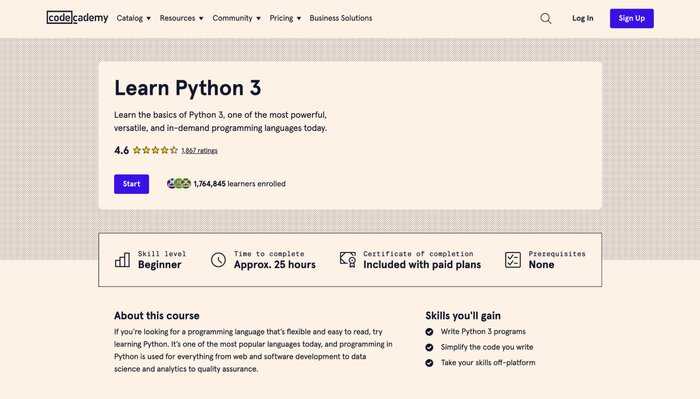
Platform: Codecademy | Teachers: N/A | Course length: Approx 25 hours
The third option on this list does teaching a little differently.
Codecademy is one of the most popular online coding sites, with over 45 million users. Programmers from across the world have gotten started using this platform.
What makes Codecademy unique is that there are no ‘instructors’ per se. Rather, everything is taught through exercises and hands-on examples.
This means that you’ll get a strong sense of how to use Python right off the bat. This course itself has over a million students enrolled.
You will learn:
- How to get started
- Control flow
- Lists
- Loops
- Functions
- Strings
- Modules
- Dictionaries
- Files
- Classes
Pros:
- Hands-on teaching, so you get direct experience in coding as you learn
- Covers a lot of the foundational content
- Combines quizzes, projects and articles, so your brain is constantly working
- Ideal for beginners
- Certificate of completion included with paid plans
- Includes lots of helpful examples of how Python can be used
Cons:
- Some people may not enjoy the hands-on teaching style and might prefer an actual teacher to guide them through the content
Best for: Anyone who’s new to Python and would prefer learning in a hands-on method
Overall: Codecademy is by far one of the most popular places to learn how to code online, and it's easy to see why. By combining its teaching materials with projects and quizzes, this class allows you to write and experiment with your coding right off the bat. This not only means that you’ll learn Python rapidly, but you will also develop wider intuitions about programming. So why not join the other million students already involved.
4. Learn Python Programming Masterclass (Udemy)
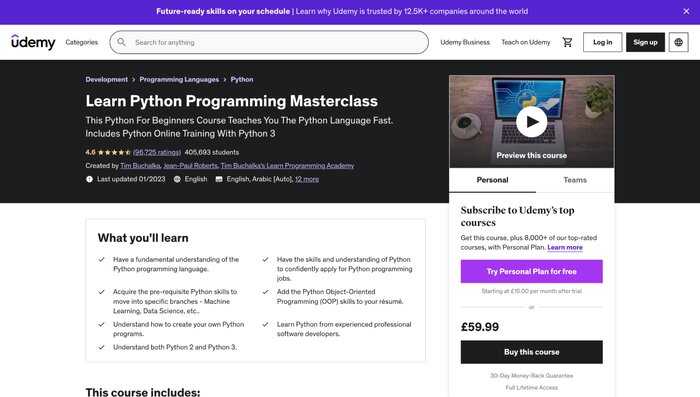
Platform: Udemy | Teachers: Tim Buchalka and Jean-Paul Roberts | Course length: 72.5 hours of on-demand video
The fourth pick on this list marks a return for Udemy. This is also the longest option.
The USP of this course is the instructor's experience. Between them, Tim Buchalka and Jean-Paul Roberts have over 70 years of coding experience.
There are also reams of content, with over 70 hours of video lessons.
This class markets itself as ideal for beginners, and has over 400,000 students enrolled, with a rating of 4.6 stars from over 90,000 reviews.
You will learn:
- Install and setup
- Program flow control in Python
- Lists and tuples
- Functions
- Object oriented Python
- Generators, comprehensions and the timeit module
- Big O notation
- Extra information
Pros:
- Hours and hours of content
- Very experienced instructors
- 15 additional materials
- Continuously updated
- Well structured
- Engaging, with the team rapidly responding to any queries
- Often on sale for a much cheaper price than advertised
Cons:
- Sometimes mixes Python fundamentals with more advanced topics
Best for: Anyone new to Python who is seriously considering it as something they will use later in their career
Overall: Over 70 hours of content is quite remarkable. This alone would set Learn Python Programming Masterclass apart. However, its quality is heightened by the experience of its instructors and their rapid response times to questions, as well as the wide range of additional resources. Ultimately, with a 4.6 star from over 90,000 students, this course seems to be ideal for helping beginners integrate Python into their lives.
5. Introduction to Python (Datacamp)
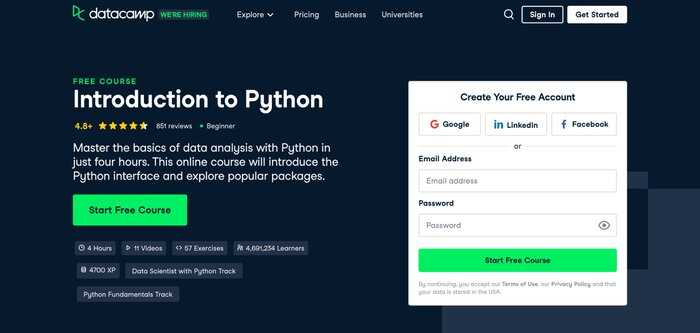
Platform: Datacamp | Teachers: Hugh Bowne-Anderson | Course length: 4 hours
This is a skills-focused platform which aims to teach you programming languages and wider data science in a professional, clear and easy-to-follow way. Founded in 2013, it now has over 6 million users.
Given that Python is one of the most talked about coding languages out there, it makes sense that this is one of Datacamp's most popular courses, with over 4 million enrolled.
This class is a little shorter than some of the other options, so it’s ideal for anyone who wants a crash course on the basics of Python.
You will learn:
- Introduction to Python
- Using Python interactively by using a script
- Creating variables
- Basic Python data types
- Storing, accessing and manipulating data in lists
- Using functions, methods and packages to leverage code
- How to use NumPy; an essential Python package for data science
Pros:
- Data science focused
- Not a huge investment of time but covers a lot of ground
- Includes 57 exercises for you to hone your skills
- Taught by top data scientists
- Orientated towards beginners with a professional interest in Python
- Included in a wider Python Track, so there is something to move on to once you finish this course
- Endorsed by leading companies like Google and Microsoft
Cons:
- Only for beginners
- Not as comprehensive as some other courses on this list
Best for: Beginners who have an interest in a data science career, particularly using Python
Overall: Datacamp’s motto is ‘Data drives everything. Get the skills you need for the future of work’ and this sums up the value of this course. Here, you will learn the fundamentals of Python in just four hours, but with a specific orientation towards data science. From there, you can move on to other Datacamp classes and start your journey as a data scientist.
6. The Python Tutorial (Python)
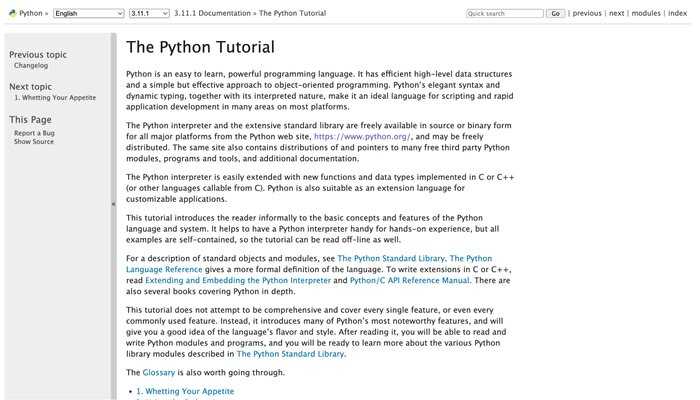
Platform: Python | Teachers: N/A | Course length: 16 documents of tutorial
Sometimes it's better just to learn straight from the source.
This option comes from the developers of Python themselves and it functions a little differently to some of the other options on this list.
Firstly, this class primarily takes the form of a series of documents and articles that walk you through how to use Python and all the various functions you can employ the code for.
However, this course is also 100% free, which is mind-boggling when you consider just how much content is available here.
You will learn:
- An introduction to Python: numbers, lists, strings
- Control flow tools
- Data structures
- Modules
- Inputs and outputs
- Errors and expectations
- Classes
- The standard library
- Virtual environments and packages
Pros:
- From Python itself, so will be up-to-date
- A wide range of content
- Gets straight to the point
- Can be used as a continual reference as you try Python
- Includes helpful visuals
- Totally free
Cons:
- No person-led instruction, which some people prefer
- Not very engaging
Best for: Anybody who likes learning on the go and would like to have a Python course as more of a reference guide as they try the language out for themselves
Overall: This course is ideal for anyone who feels like the instructor-led video lessons on the rest of this list aren’t for them. Rather, all the information you need to know about Python is right here and provided by the creators of Python themselves. This course is also absolutely free, so you incur no financial losses by trying it out.
7. Applied Data Science with Python Specialization (Coursera)

Platform: Coursera | Teachers: Christopher Brooks | Course length: 5 courses, each recommended to last 4 weeks
Our seventh option is one for the more advanced students of Python. It also marks a return for Coursera to the list.
Data science is increasingly becoming one of the most in-demand skills in the jobs market, with Python a super popular programming language.
With more and more people moving into the data science realm, this course couldn’t have come at a better time.
The demand for a Python course that focuses on applied data science is reflected by this option's popularity with over 365,000 students already enrolled.
You will learn:
- An introduction to data science in Python
- Applied plotting, charting and data representation in Python
- Applied machine learning in Python
- Applied text mining in Python
- Applied social network analysis in Python
Pros:
- Focuses specifically on data science
- Offered through a top university
- Something for more advanced students looking to use Python specifically for data science
- Includes hands-on projects
- Taught by highly qualified associate and assistant professors from the School of Information
- The opportunity to earn certification through the paid track
- The first course in the specialization is available for free
Cons:
- Might be too specific for some users, especially those completely new to Python
Best for: As the title suggests, anyone interested in using Python for data science
Overall: As data science becomes more and more important in the working world, and Python grows in popularity alongside it, this course will only become more relevant. Here, you are taught about how to become a top data scientist by using Python, learning with professors from the University of Michigan. And, to top it's available for free!
8. CS50’s Introduction to Programming with Python (edX)

Platform: edX | Teachers: David J Malan | Course length: 10 weeks, with 3-9 hours per week recommended
edX is partnered with leading institutions such as Harvard, Yale and Cambridge to provide its lessons. This means that you’ll receive top-quality classes from very experienced instructors.
However, perhaps the most impressive thing about edX is that its content can be accessed for free. You can take a variety of courses on subjects ranging from biology to business studies without paying a cent.
CS50x is the online version of CS50, one of Harvard’s most popular classes. Over 4 million have enrolled onto CS50’s Introduction to Computer Science, with 400,000 enrolled on this Python course.
You will learn:
- Functions and variables
- Controls
- Loops
- Exceptions
- Libraries
- Unit tests
- File I/O
- Regular expressions
- Object-oriented programming
Pros:
- Offered by the world’s leading university
- Highly qualified instructors, in both teaching and computer science
- Entirely self-paced
- A wide range of content that will see you rapidly improve
- Can be taken on its own, or in tandem with CS50x courses
- The opportunity for a certificate of completion with the paid track
- Free!
Cons:
- Requires you to enroll by a certain time
- Receiving a certificate and other additional materials requires you to take the paid track
Best for: Learners who value taking classes from renowned and respected institutions, as well as those who aren’t sure about investing in a Python course and want to try something without financial loss
Overall: edX is truly changing how we learn. Like many courses on this list, this option covers all the foundational information you need to know to get started with Python. However, what sets it apart is not only the fact that the content and instructor both come from Harvard, one of the top universities in the world, but also that the lessons are available for free!
9. 100 Days of Code: The Complete Python Pro Bootcamp for 2025 (Udemy)
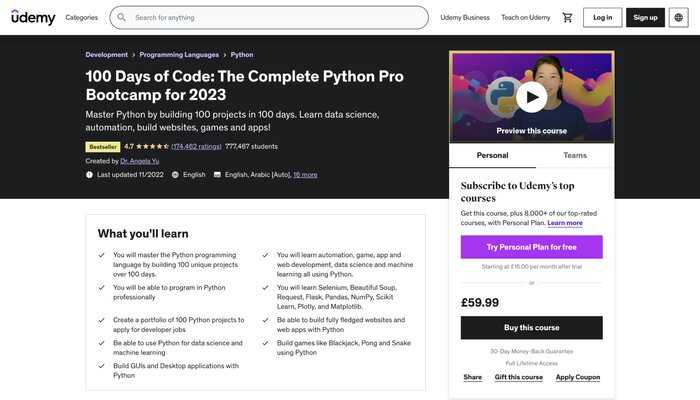
Platform: Udemy | Teachers: Dr Angela Yu | Course length: 60 hours of on-demand video
Like the other Udemy offerings, this course has very impressive credentials. It has an enrolment of over 700,000, with a 4.7-star rating based on over 170,000 reviews.
However, what makes this class stand out is how it is structured. The idea is that you learn to code over 100 days by doing a new project each day.
By taking the courses (60 hours of on-demand video) and trying out the project for yourself, you will get a real sense of how to use Python in no time; well, in 100 days!
You will learn:
- Programming professionally in Python
- Create a portfolio of 100 Python projects
- Using Python for data science and machine learning
- Building GUI’s and desktop applications
- Automation, game, app and web development in Python
- Building fully-fledged websites and web apps
Pros:
- Teaches you through hands-on projects, which is ideal for a skill like coding
- Gets you coding right off the bat
- Allows you to create a portfolio of projects
- Demonstrates all the various ways Python can be used
- Led by an experienced instructor who has taught over a million students
- Gives you a strong foundation in Python
Cons:
- A little outdated
- Title may lead to unrealistic expectations; there is no rush!
Best for: New programmers, particularly those who prefer hands-on learning and want to develop a portfolio of projects.
Overall: if you’re looking for employment that requires Python, or just to demonstrate your general competency with the language, having a series of completed projects you can share is key. What makes this course so special is that it will provide you with a portfolio that you gradually add to as you learn. Although it will take a very diligent mindset to complete it in 100 days, if you do stick with it I’m sure you’ll find that the title isn’t misleading.
10. Crash Course on Python (Coursera)
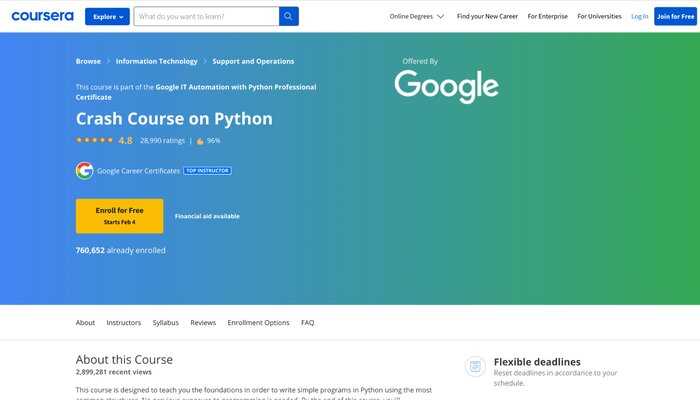
Platform: Coursera | Teachers: Google Career Certificates | Course length: 6 lessons, ranging from 2 to 6 hours to complete.
My last option is also the final offering from Coursera. Offered by Google through Google Career Certificates, this class aspires to be a very basic, foundational introduction to Python.
With over 700,000 already enrolled, it’s been a starting place for many people already, and a 4.8-star rating from over 29,000 reviews means most of those customers were very satisfied.
You can take the entire course for free as long as you don’t require certification. If you do, there is additional charge, usually around $40.
You Will Learn:
- Introduction to Python
- Basic Python syntax
- Loops
- Strings, lists and dictionaries
- Object oriented programming
- Applying problem-solving frameworks to a project
Pros:
- Very foundational
- Includes a mix of video lessons and hands-on projects
- Culminates in a final project where you can test what you’ve learnt
- Positive and clear instruction from the teacher
- Includes quizzes that challenge what you’ve been taught
- Paid track includes a certificate of completion
- Content available for free
Cons:
- Sometimes doesn’t go into as much detail as it should
- Requires students to do quite a bit on their own to fully understand Python
Best for: Absolute beginners looking for a Python introduction but aren’t sure if a Python course, or Python itself, is for them.
Overall: I’m ending this list with a very foundational introduction to how Python works. This course includes a range of short video lessons, followed by quizzes and hands-on projects that allow you to really test your knowledge and get to grips with the basics fast. And don’t forget, it can be taken free. So even if you aren’t sure about this class, there is no harm in checking it out.
What are the advantages of taking an online Python course?
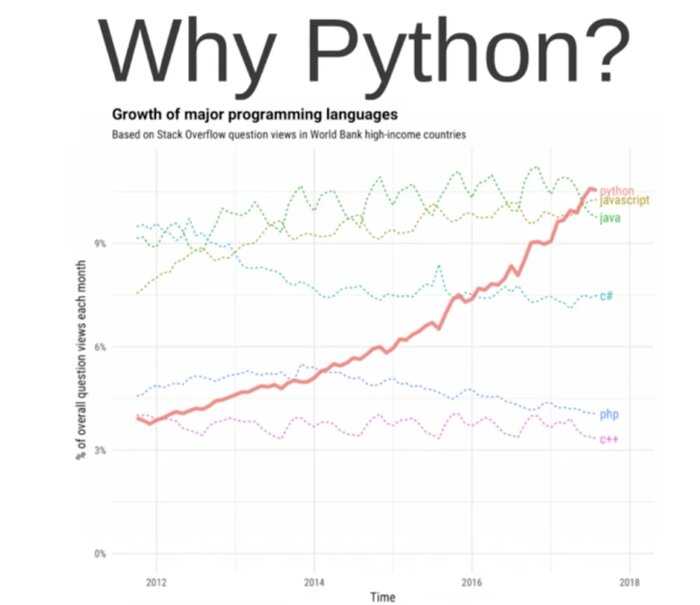
Coding is becoming an essential element of how we live our lives. Python itself is one of the most popular, widely used and highly regarded programming languages out there.
If you’re interested in coding, there are a couple of advantages to learning Python in and of itself:
- Relatively easy to pick up and learn
- Very productive
- Open-source
- An incredible library
- Easily portable
- Readable
- Can be extended to other languages
There are also advantages to learning Python using an online course:
- Access to top instructors from all around the world
- You can learn when you like and fit everything around your schedule
- You can combine different platforms
- There’s access to endless additional materials
- The skill will stay with you for life
- Your general coding intuition will improve
- Learning a new skill is great for engaging the brain, particularly learning a coding language
Buyers guide: what to look out for
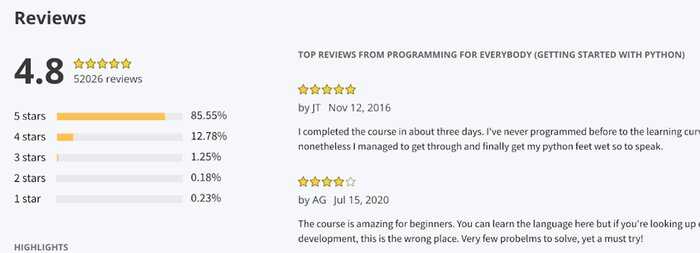
With so many choices, it can be hard to know what to look out for when selecting the best Python course for you.
So here’s a helpful buyers guide to look out for:
- Positive reviews and feedback from both users and sites like Learnopoly
- The credentials of the instructor
- How long the course is and what each lesson will teach you
- Any additional materials like guides and workbooks
- Hands-on practical lessons where you write your own code
- How many people are enrolled
- Is there any free trial or refund available?
How much does it cost?
The cost of these courses ranges from being absolutely free to costing $59.99 per month. However, there are a couple of caveats.
Different options are priced differently. For example, Udemy prices and sells its courses separately. So, if you’re just looking to learn Python, this would be ideal.
Comparatively, sites like Codecademy and Datacamp are subscription services. This means that you pay a monthly or annual fee for access to all of the content on the website.
If you are interested in learning other programming languages and computer science content alongside Python, this might be a better option.
Finally, some classes are available for absolutely free. Python is an open-source language, so the Python tutorials are accessible to anyone.
Coursera and edX also have a free audit option, where you can access the content of their courses for free, although you will miss out on a certificate and other additional materials.
The fact that such an essential programming language can be taught for free is quite incredible.
How long does it take to learn Python?
The courses on this list range from 4 hours to 72.5 hours.
However, that does not mean it takes this long to learn Python. As I mentioned, I have chosen the options on this list in order to show the diversity of choices out there.
This means that most of these classes have very different lesson styles. Whereas some are more traditional, with an instructor taking you through what you know, others are more hands-on, with you learning Python as you complete tasks and challenges that require writing your own code.
For the latter courses, how long it takes to learn will depend entirely on you, what pace you go at and how quickly you understand and execute each task.
However, even the video lessons will often include additional resources and challenges for you to complete in your own time.
Finally, you should allocate a bit of time for personal practice. As with any skill, coding, and Python, in particular, requires you to go over what you’ve learnt in your own time to make it all stick in your head.
Conclusion
In my opinion, the best online Python course is Python For Everybody Specialization, which is offered by Coursera.
This is my top pick because it has a wide range of content that is designed to be accessible to everybody.
New programmers can get comfortable with Python, whereas more seasoned developers might still find something new.
Another option is Udemy’s The Complete Python Bootcamp From Zero to Hero in Python. This is one of the most popular Python classes across the internet, with over a million students enrolled.
The 22 hours of content, clear instruction and additional materials make it easy to see why it's so popular. Udemy courses are also often on sale, so you can often get this class for cheaper than the initial price.
Finally, if you’re more of a hands-on learner, check out Codecademy’s Learn Python 3, which employs a code-as-you-go method. Codecademy is also a subscription service, so if you’re interested in additional computer science lessons, this might be a good one to check out.
Related articles: Best AI courses, best game development courses
Best Python Courses-Frequently asked questions
What is the best online Python course?
Coursera’s Python For Everybody Specialization
How much does a Python course cost?
The cost of these courses ranges from being absolutely free to costing $59.99 per month.
How long do Python courses take?
The courses on this list range from 4 hours to 72.5 hours.

Charlie is a student reading politics at King’s College London. He is also a passionate musician with over 14 years of experience. In his free time, he also enjoys cinema, long-distance running and learning new things.



I am just writing to make you be aware of what a fine discovery my cousin’s princess undergone studying your web site. She realized many details, not to mention what it is like to possess a great giving nature to get men and women without difficulty thoroughly grasp a number of advanced subject areas. You undoubtedly did more than our own desires. Thank you for coming up with those good, healthy, educational and as well as unique guidance on the topic to Sandra.
Thank you so much for your thoughtful message! It truly means a lot to hear that Sandra found value in the content. I’m so glad it could be helpful and inspiring. Wishing her all the best in her learning journey, and I appreciate you taking the time to share this kind feedback!
Hello there! I could have sworn I’ve been to this website before but after browsing through some of the post I realized it’s new to me. Anyhow, I’m definitely glad I found it and I’ll be book-marking and checking back frequently!
Hey there! Thanks for stopping by! I’m glad you found the site and that you’re enjoying the posts. Feel free to bookmark and visit anytime—there’s always something new to check out. Looking forward to seeing you around!
Howdy! I know this is somewhat off topic but I was wondering which blog platform are you using for this website? I’m getting tired of WordPress because I’ve had issues with hackers and I’m looking at alternatives for another platform. I would be awesome if you could point me in the direction of a good platform.
Howdy! 🙂 No worries about the off-topic question—I’m happy to help! If WordPress has been giving you trouble, you might want to check out platforms like Ghost, Squarespace, or Webflow, depending on your needs. Ghost is great for blogging with a focus on speed and simplicity, while Squarespace and Webflow offer more design flexibility with built-in security. Let me know if you need any specific recommendations! 😊